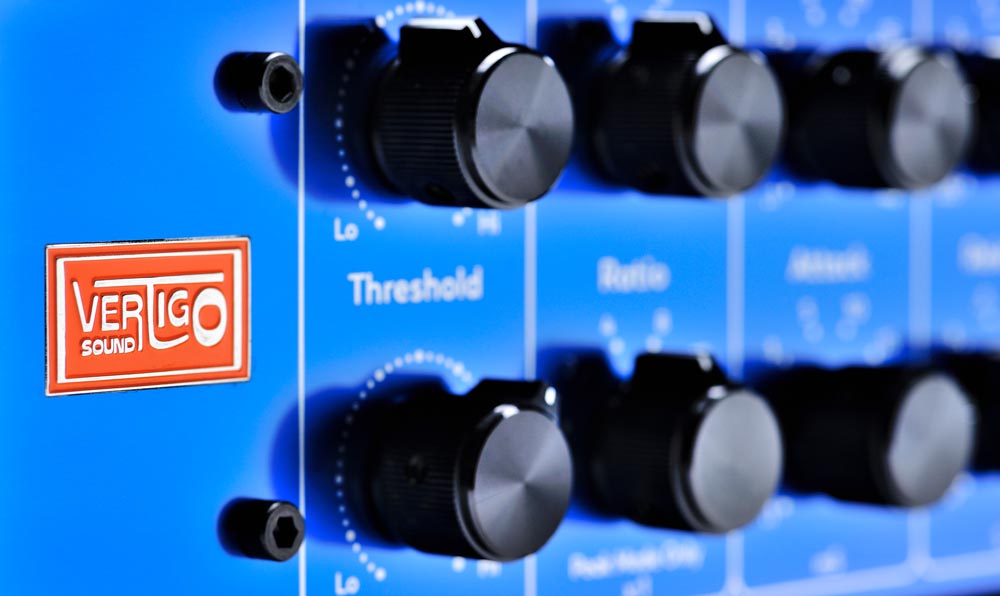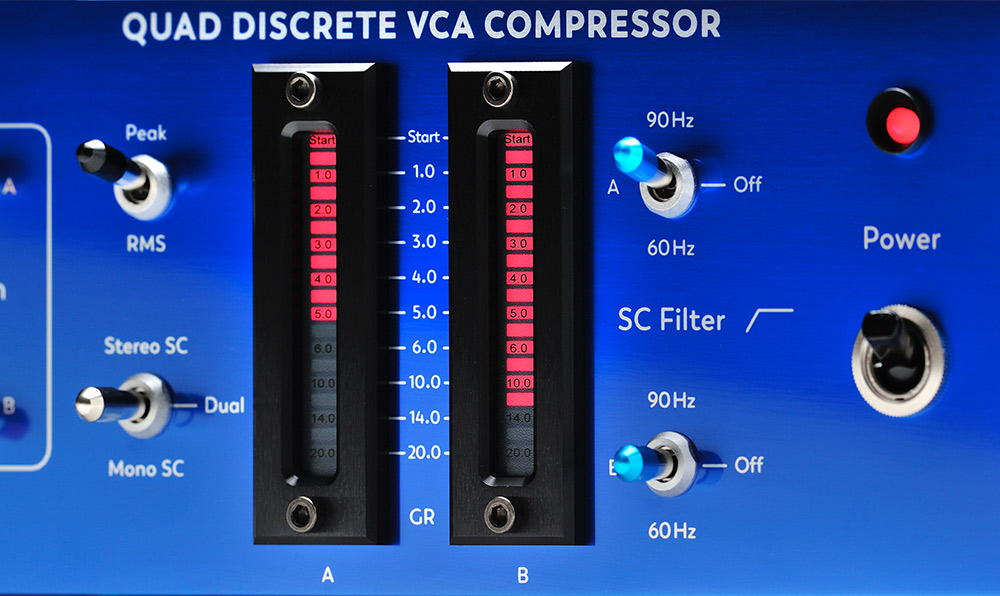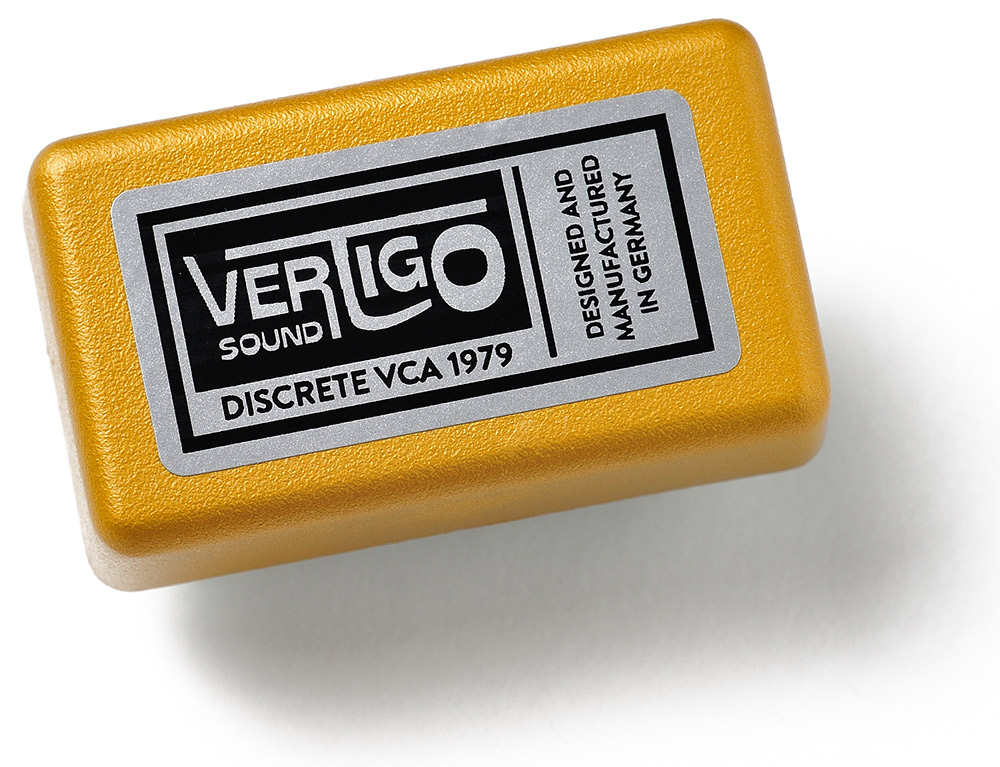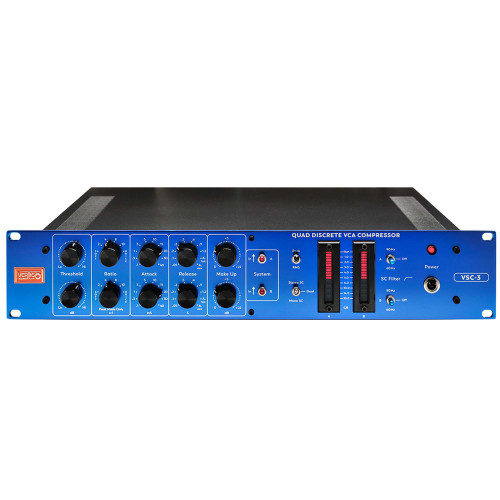The VSC-3 is the legal successor of the VSC-2, which now is a modern classic and can be found in many top class studios around the world.
Vertigo Sound spent a lot of effort making a good product even better. The VSC-3 can do all the tricks the VSC-2 is known and loved for plus a bunch of new features and options.
The VSC-3 is still named QUAD DISCRETE COMPRESSOR because it`s topology stays the same.
It is so named, because it uses 4 VCAs built using only discrete components. It’s design is a nod toward the best VCA based compressors of the 70s and 80s.
The Vertigo VCA is in fact named 1979. Some of the best features of these classic Compressors have been complimented in the VSC.
This classic based topology is combined with a modern mastering grade signal path. Some unique and innovative features lie beneath the bonnet, such as the ratio which increases with level in ‘Soft’ mode.
VSC-3
UNIQUE FEATURES


One for all!
- Dual Mono, True Stereo SC & Mono summed SC functionality
- switchable to RMS or PEAK Detection
- Dual - Mono, no shared contols - Mid side capability
- Stereo and Mono SC Mode Channel A controls become master
- The Stereo signal is phase coherent under all settings
- No phase shift or L-R problems can occur due to the innovative SC design
- Signal path is of Mastering quality
- Real stereo mode! Channel A is stereo master
- There is a minimum of circuitry with a hard relay bypass
- Settings from Soft Knee (Soft=TipToe) to Hard Knee (Brick)
- The Ratio selection switch compensates to provide equal loudness, allowing immediate comparison
- Easy to recall! All parameters are detented (optional for Threshold & Makeup)
- Wide selection of time constants. You can choose between 10 Attack and Release settings
- Slow and fast Auto release Mode
- Side chain High Pass Filters with two switchable frequencies are provided onboard
- 20 segment gainreduction bargraph meter for each channel 0,25dB to 20dB
- Handsome parameter control via customized scale ranges
- Internal components are of the ultimate quality, modified where necessary
- A Toroid transformer ensures no PSU noise
- The ‘1979’ VCA is made of individual components, no Integrated Circuits
- Encased in a ceramic material for thermal stability
- Discrete VCA adds vintage character to the sound
- The harder it compresses the more it colours
- This VCA delivers Real Analogue punch
- A Cinemag transformer and a state of the art line-out driver complete the picture by providing perfectly balanced In and Outs
THE HEART
OF THE VSC-3

THE DISCRETE VCA 1979
99% of all newer designs use an I-ntegrated C-ircuit for this job which makes production easy and cost extensive. Here‘s the big difference!
The Vertigo Sound 1979 is a fully discrete V-oltage C-ontrolled A-mplifier. This VCA colours the signal the more you compress and „Make Up“ the output. This basic effect plus a very well thought out circuitry and choice of components gives you a fresh, punchy precise sound without sounding dull or nasty even if the unit is pushed hard.
THE CONCEPT OF THE VSC-3
The Quad Discrete Compressor uses four discrete 1979 VCAs in it’s two channels. Each channel has one VCA in the Audio Path and another in the sidechain. In Stereo SC Mode both sidechains are fully active; they are not summed together. The higher signal peak on either channel results in equal compression of both.
In Stereo SC Mode the VSC-2 reacts even to out of phase signal peaks without image shift. This is a unique innovation, far removed from simple Stereo Linking. The precision of this technique makes the Vertigo ideally suited for Mastering and Mix Bus compression. The Mono SC Mode is the exact opposite and is primarly designed to work in combination with RMS or for effect compression.With Dual Mode each channel has entirely separate controls and metering.
Crosstallk is less than minus 100dB, like two separate units!

THE
SPECS
OF THE
VSC-3
Technical Specifications
- True Stereo SC /Mono summed SC/ Dual Mono switchable
- Cinemag Balanced In. That 1646 out
- Dynamic Range: 115 db
- Frequency response: 10 Hz … 70 kHz at -3dB gainreduction
- Max. Output Level: + 27 dBu / 600 Ohm balanced floating
- Signal to Noise Ratio at + 6 dBu = 97 db (20..20 kHz, unweighted, RMS)
- Noise: – 91 dBu (20 Hz – 22 khz – unweighted, RMS) @ 0 db Unity Gain
- Crosstalk between channels: > 100 db at any frequency
- Power consumption: max 12 Watts











